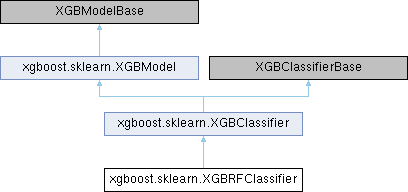|
| | __init__ (self, *float learning_rate=1.0, float subsample=0.8, float colsample_bynode=0.8, float reg_lambda=1e-5, **Any kwargs) |
| |
| Dict[str, Any] | get_xgb_params (self) |
| |
| int | get_num_boosting_rounds (self) |
| |
| "XGBRFClassifier" | fit (self, ArrayLike X, ArrayLike y, *Optional[ArrayLike] sample_weight=None, Optional[ArrayLike] base_margin=None, Optional[Sequence[Tuple[ArrayLike, ArrayLike]]] eval_set=None, Optional[Union[str, Sequence[str], Metric]] eval_metric=None, Optional[int] early_stopping_rounds=None, Optional[Union[bool, int]] verbose=True, Optional[Union[Booster, str, XGBModel]] xgb_model=None, Optional[Sequence[ArrayLike]] sample_weight_eval_set=None, Optional[Sequence[ArrayLike]] base_margin_eval_set=None, Optional[ArrayLike] feature_weights=None, Optional[Sequence[TrainingCallback]] callbacks=None) |
| |
| ArrayLike | predict (self, ArrayLike X, bool output_margin=False, bool validate_features=True, Optional[ArrayLike] base_margin=None, Optional[Tuple[int, int]] iteration_range=None) |
| |
| np.ndarray | predict_proba (self, ArrayLike X, bool validate_features=True, Optional[ArrayLike] base_margin=None, Optional[Tuple[int, int]] iteration_range=None) |
| |
|
np.ndarray | classes_ (self) |
| |
|
bool | __sklearn_is_fitted__ (self) |
| |
| Booster | get_booster (self) |
| |
| "XGBModel" | set_params (self, **Any params) |
| |
| Dict[str, Any] | get_params (self, bool deep=True) |
| |
|
None | save_model (self, Union[str, os.PathLike] fname) |
| |
|
None | load_model (self, ModelIn fname) |
| |
| np.ndarray | apply (self, ArrayLike X, Optional[Tuple[int, int]] iteration_range=None) |
| |
| Dict[str, Dict[str, List[float]]] | evals_result (self) |
| |
| int | n_features_in_ (self) |
| |
| np.ndarray | feature_names_in_ (self) |
| |
| float | best_score (self) |
| |
| int | best_iteration (self) |
| |
| np.ndarray | feature_importances_ (self) |
| |
| np.ndarray | coef_ (self) |
| |
| np.ndarray | intercept_ (self) |
| |
|
| str | extra_parameters |
| |
| Dict[str, bool] | _more_tags (self) |
| |
|
str | _get_type (self) |
| |
| None | _load_model_attributes (self, dict config) |
| |
| Tuple[ Optional[Union[Booster, str, "XGBModel"]], Optional[Metric], Dict[str, Any], Optional[int], Optional[Sequence[TrainingCallback]],] | _configure_fit (self, Optional[Union[Booster, "XGBModel", str]] booster, Optional[Union[Callable, str, Sequence[str]]] eval_metric, Dict[str, Any] params, Optional[int] early_stopping_rounds, Optional[Sequence[TrainingCallback]] callbacks) |
| |
|
DMatrix | _create_dmatrix (self, Optional[DMatrix] ref, **Any kwargs) |
| |
|
None | _set_evaluation_result (self, TrainingCallback.EvalsLog evals_result) |
| |
|
bool | _can_use_inplace_predict (self) |
| |
|
Tuple[int, int] | _get_iteration_range (self, Optional[Tuple[int, int]] iteration_range) |
| |
|
| _Booster |
| |
|
| _Booster |
| |
| "XGBRFClassifier" xgboost.sklearn.XGBRFClassifier.fit |
( |
|
self, |
|
|
ArrayLike |
X, |
|
|
ArrayLike |
y, |
|
|
*Optional[ArrayLike] |
sample_weight = None, |
|
|
Optional[ArrayLike] |
base_margin = None, |
|
|
Optional[Sequence[Tuple[ArrayLike, ArrayLike]]] |
eval_set = None, |
|
|
Optional[Union[str, Sequence[str], Metric]] |
eval_metric = None, |
|
|
Optional[int] |
early_stopping_rounds = None, |
|
|
Optional[Union[bool, int]] |
verbose = True, |
|
|
Optional[Union[Booster, str, XGBModel]] |
xgb_model = None, |
|
|
Optional[Sequence[ArrayLike]] |
sample_weight_eval_set = None, |
|
|
Optional[Sequence[ArrayLike]] |
base_margin_eval_set = None, |
|
|
Optional[ArrayLike] |
feature_weights = None, |
|
|
Optional[Sequence[TrainingCallback]] |
callbacks = None |
|
) |
| |
Fit gradient boosting model.
Note that calling ``fit()`` multiple times will cause the model object to be
re-fit from scratch. To resume training from a previous checkpoint, explicitly
pass ``xgb_model`` argument.
Parameters
----------
X :
Feature matrix. See :ref:`py-data` for a list of supported types.
When the ``tree_method`` is set to ``hist``, internally, the
:py:class:`QuantileDMatrix` will be used instead of the :py:class:`DMatrix`
for conserving memory. However, this has performance implications when the
device of input data is not matched with algorithm. For instance, if the
input is a numpy array on CPU but ``cuda`` is used for training, then the
data is first processed on CPU then transferred to GPU.
y :
Labels
sample_weight :
instance weights
base_margin :
global bias for each instance.
eval_set :
A list of (X, y) tuple pairs to use as validation sets, for which
metrics will be computed.
Validation metrics will help us track the performance of the model.
eval_metric : str, list of str, or callable, optional
.. deprecated:: 1.6.0
Use `eval_metric` in :py:meth:`__init__` or :py:meth:`set_params` instead.
early_stopping_rounds : int
.. deprecated:: 1.6.0
Use `early_stopping_rounds` in :py:meth:`__init__` or :py:meth:`set_params`
instead.
verbose :
If `verbose` is True and an evaluation set is used, the evaluation metric
measured on the validation set is printed to stdout at each boosting stage.
If `verbose` is an integer, the evaluation metric is printed at each
`verbose` boosting stage. The last boosting stage / the boosting stage found
by using `early_stopping_rounds` is also printed.
xgb_model :
file name of stored XGBoost model or 'Booster' instance XGBoost model to be
loaded before training (allows training continuation).
sample_weight_eval_set :
A list of the form [L_1, L_2, ..., L_n], where each L_i is an array like
object storing instance weights for the i-th validation set.
base_margin_eval_set :
A list of the form [M_1, M_2, ..., M_n], where each M_i is an array like
object storing base margin for the i-th validation set.
feature_weights :
Weight for each feature, defines the probability of each feature being
selected when colsample is being used. All values must be greater than 0,
otherwise a `ValueError` is thrown.
callbacks :
.. deprecated:: 1.6.0
Use `callbacks` in :py:meth:`__init__` or :py:meth:`set_params` instead.
Reimplemented from xgboost.sklearn.XGBClassifier.

 Public Member Functions inherited from xgboost.sklearn.XGBClassifier
Public Member Functions inherited from xgboost.sklearn.XGBClassifier Public Member Functions inherited from xgboost.sklearn.XGBModel
Public Member Functions inherited from xgboost.sklearn.XGBModel Data Fields inherited from xgboost.sklearn.XGBClassifier
Data Fields inherited from xgboost.sklearn.XGBClassifier Data Fields inherited from xgboost.sklearn.XGBModel
Data Fields inherited from xgboost.sklearn.XGBModel Static Public Attributes inherited from xgboost.sklearn.XGBClassifier
Static Public Attributes inherited from xgboost.sklearn.XGBClassifier Protected Member Functions inherited from xgboost.sklearn.XGBModel
Protected Member Functions inherited from xgboost.sklearn.XGBModel Protected Attributes inherited from xgboost.sklearn.XGBClassifier
Protected Attributes inherited from xgboost.sklearn.XGBClassifier Protected Attributes inherited from xgboost.sklearn.XGBModel
Protected Attributes inherited from xgboost.sklearn.XGBModel